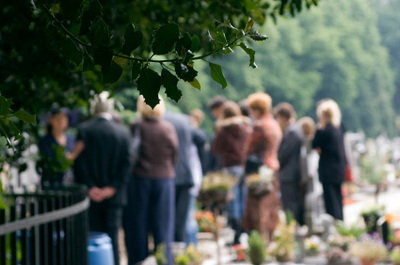Loss
"Grief is a multi-faceted response to loss, particularly to the loss of someone or something to which we have formed a bond. Although conventionally focused on the emotional response to loss, it also has physical, cognitive, behavioral, social, and philosophical dimensions. Common to human experience is the death of a loved one, whether it be a friend, family, or other companion. While the terms are often used interchangeably, bereavement often refers to the state of loss, and grief to the reaction to loss." (Wikepedia)
Grief affects everyone: it is the universal reaction to loss. It is painful and stressful, but also natural, normal and necessary. We will focus on the feelings and reactions you are most likely to experience after a death, also the feelings experienced at the end of an important relationship, or another major loss.
Thoughts and Feelings
There are no right or wrong ways to respond to death. You need to grieve in your own way and in your own time. It might mean crying, or not. This may take months and years, or not. Your feelings and reactions can change from hour to hour. Some days you'll be up and some days you'll be down again.

At he beginning it can be hard, but as you learn to adapt to your changed circumstances your emotional swings will lessen in intensity, Here is a summary of some common feelings
- Shock and disbelief. It may take a long time for the news of the death to sink in. You can't believe it; you don't want to believe it.
- Loss. Your loss is so great - the person, their friendship, their companionship, their love. With this comes a deep sadness.
- Guilt and regret. You might regret having said something hurtful or not visiting the as you had promised. You may feel guilty to be alive when another is dead. If the death was suicide, feelings of regret and guilt may be higher. You may even blame yourself.
- Anger. You might feel angry with people or the universe for: -
- causing the death
- not being able to cure the illness
- not understanding your feelings
- making thoughtless remarks
- carrying on with life and having fun.
- You might feel angry with the deceased for dying and abandoning you and for the pain as a result of their death.
- Injustice. How could s/he die so young? It's not fair!
- Envy. You might envy others for having what you have just lost - the friend, lover, mother, father.
- Loneliness. Grieving can be lonely. You feel that no-one can possibly understand what you are going through. You lost a big part of your life.
- Depression. Feeling sadness is natural. For a time you could lose interest in life and feel that there's no point in going on. At worst you might feel despair.
- Relief. You might feel relieved, especially after a long illness.
- And finally you may that these reactions will go on forever - they won't. You may want to avoid such difficult feelings, but for healing to occur the grief has to be experienced and expressed.
Effect on Behaviour
Grief also affects our behaviour. You may someof the following:
- Sleep disruption.
- Loss of appetite.
- Restlessness.
- Exhaustion.
- Preoccupation.
- Anxiety and panic.
- Inability to cope.
- Loss of interest.
- Irritability.
- Tearfulness.
- Other physical symptoms. Palpitations, nausea, dizziness, tightness in the throat and digestive problems. -
- These are all normal and understandable reactions to bereavement and a natural part of the mourning process. Given time, support and understanding they will lessen and eventually disappear.
Ways of Coping
Most of us have reserves of strength. Usually we don't need to call upon them, but when we are grieving we do. You may feel that it is all too much and that you can't cope. With the help of friends and your inner resources you will recover.
The following may help:
- Start by accepting that you may need help. Ask someone you feel you can trust. It may make sense to seek counseling.
- Talk about it - "get it off your chest". It brings relief. Choose someone you feel you can trust. Even talk to a favourite pet. If you are a believer, talk to God.
- Express yourself in another way. You can write about your feelings and experience
- Keep some mementos to remember the person who has died. Remembering can be painful at first, but with time painful memories will be replaced by ones that can give you pleasure and comfort.
- Get some exercise. Exercise uses up excess energy and you may express some of your frustration and aggression.
- Listen to music. . Choose music that suits your mood. you may also use music to help you forget your grief.
- Take good care of yourself. Eat well, shower regularly and get the sleep you need. Alcohol and drugs only bring short-term relief and postpone the process of grieving.
- Trust yourself. Within reason. If you want to be alone, or to go out and be with people, then do that. It is normal to feel the way you do following a bereavement. Accept your feelings.
- Don't expect too much of yourself too soon - grieving takes time. Don't worry too much about tomorrow or next week.
In time you will be able to give your attention and emotions to others and begin to get on with the rest of your life.
You will probably be changed by the experience . You may reassess your priorities, values, beliefs, hopes, aspirations, friendships. You may find that you are:
- more aware of others' difficulties
- more understanding
- more able to cope with life's losses

